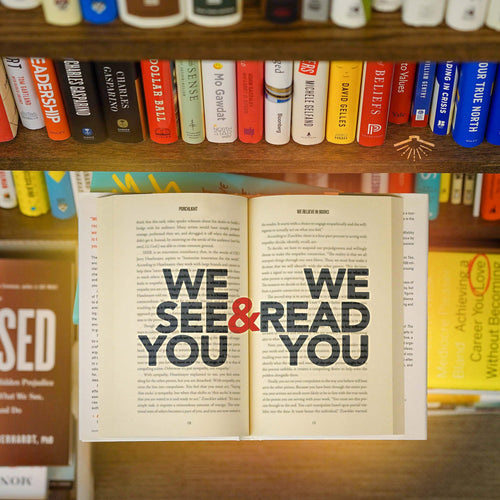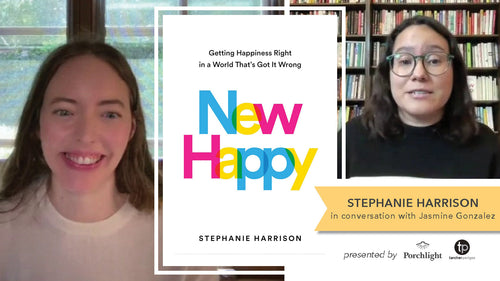The Everything War: Amazon's Ruthless Quest to Own the World and Remake Corporate Power
Dana Mattoli's book, The Everything War, uncovers Amazon's harmful impact on small businesses and underscores the need to shop local and invest in our communities.
The Everything War: Amazon’s Ruthless Quest to Own the World and Remake Corporate Power by Dana Mattioli, published by Little, Brown and Company
 In case you hadn’t yet heard, this year’s Amazon Book Sale runs from April 23 to 28, 2025, directly overlapping with the 12th Annual Independent Bookstore Day on Saturday, April 26.
In case you hadn’t yet heard, this year’s Amazon Book Sale runs from April 23 to 28, 2025, directly overlapping with the 12th Annual Independent Bookstore Day on Saturday, April 26.
Coincidence? Given that the first Amazon Book Sale took place in late May of 2024, it’s hard not to view this date change as a direct challenge to the rest of the book industry, a deliberate ploy to lure potential shoppers away from their local bookstores by offering (literally) unbeatable low prices on books. Apart from Independent Bookstore Day being a major revenue generator for local bookstores, it’s a growing tradition that brings communities of readers together to celebrate with each other every year. Understandably, independent bookstores across the country have expressed their displeasure with Amazon’s tactic.
In The Everything War, a deeply researched narrative of Amazon’s origins and explosive growth, journalist Dana Mattioli uncovers the impact that Amazon has had not only on local bookstores but on a vast number of industries in its pursuit of dominance.
How Amazon Undercuts Its Competitors
“There was a common mission among many of the early employees to democratize reading,” Dana Mattioli writes of the first people who worked at Amazon. Among that first group were writers, academics, and music lovers embedded in Seattle’s nascent grunge scene. Amazon, then, was a threadbare website on the burgeoning internet, a simple portal between the nation’s largest book distributors and shoppers who might not have easy access to a brick-and-mortar bookstore.
This vision of what Amazon might have been feels quaint today, even laughable. Perhaps, under someone else’s leadership, Amazon would have moved forward with such a bohemian ethos, finding its niche in the book world alongside neighborhood shops and filling the gap of getting books to remote places. Yet, as Mattioli reveals through her deeply researched narrative, founder Jeff Bezos chose books as a simple entry point for his new endeavor.
Assigned by his then-employer, hedge fund D.E. Shaw, to find new ways to use the internet to revolutionize everyday tasks, Bezos dove into retail and was amazed by the untapped potential for e-commerce. Books, a product in constant supply that was small enough to handle and ship inexpensively, offered the easiest way to get started, and Bezos soon left his job to pursue this new experiment. It was never about a genuine passion for books or even for profits, as with any other retail business. Rather, the goal has always been conquest.
With each new category it expanded in, Amazon chose growth over profits. Those gains often came at the expense of its rivals. It was seen as a zero-sum game. For every item that Amazon sold in the new categories it entered, it meant a loss from a physical store that merchandised that item.
Amazon’s meteoric rise hasn’t come from the grassroots—that is to say, it has not been a simple matter of consumers choosing to turn to Amazon because it offers the best goods and services. Mattioli uncovers multiple instances of the company steamrolling competitors and partners alike, including selling diapers at a loss to undercut e-commerce company Quidsi, or meeting with the creator of the voice-activated Ubi device under the guise of acquisition, only to turn around months later with their own carbon copy, the Echo. Smaller startups, neighborhood stores, and independent creators without the financial backing and legal muscle to fight back have thus been forced to capitulate to Amazon’s demands time and time again.
Amazon isn’t the best choice for consumers—it's often the only choice. This is hardly the healthy competition and availability of choice that free market capitalism has promised, but rather, the imposition of one man’s questionable vision upon the rest of the world.
As Bezos planned, cheap books have become the entry point for onboarding new loyal Amazon customers. Today, Amazon’s revenue streams are massive and varied, allowing the company to sell books at or below cost. Known as loss leader products, the idea is that a customer who arrives at the site to buy heavily discounted books will take advantage of the convenience of finding anything else they might need to buy other, more profitable items from Amazon within the same purchase or in the future.
But of course, everything comes at a cost.
How Amazon Affects Local Bookstores
Mattioli shares the story of Anna Dreda, a bookseller who fulfilled a long-held childhood dream by buying the bookstore she had worked at for over a decade. Wenlock Books, stocked with a variety of books for just about every reader imaginable, became a haven for the local community, a place where families could attend weekly story times and book clubs could gather around the store’s giant wooden table for discussions. Soon, the bookstore became the main driver behind wider community events, from a poetry festival to a themed train ride where local drama students and magicians re-enacted the experience of riding the Hogwarts Express while children and their families read the latest Harry Potter book.
However, the growing specter of Amazon loomed large over the store. Customers would browse the shelves at the store and then leave to buy them for less online. “‘Amazon was selling books for just the cost of postage,’ [Dreda] said. Some would come to the register with a book and ask if she could match Amazon’s price. She couldn’t.” After years of trying to cut costs and keep the store afloat, Wenlock Books closed in 2019.
Why Do Independent Bookstores Matter?
When Wenlock Books closed, Dreda noted that the community wasn’t simply losing an outlet to buy books, but a place that brought people together and made their lives special. Mattioli writes that one of Dreda’s former customers was so inspired by his childhood experience on the Harry Potter-themed train ride that he went on to pursue a career in the publishing industry as an adult.
“People had so many memories attached to the bookshop, and they realized what they were losing,” she said, adding that you can buy a book on Amazon, but that the retailer would never be able to replicate the experiences a local bookstore and bookseller provide.
When I reached out to other booksellers to hear their thoughts, I heard the same sentiment: local bookstores offer a humanizing and transformative experience that cannot be replicated by a faceless corporation.
“As the weight of the world around us gets heavier and heavier, the importance of a physical gathering space becomes so important,” says Margaret Leonard, co-owner of Dotters Books in Eau Claire. “I've found that our efforts to create a safe place for all people to come in, rest, and find themselves on the shelves have really allowed us to get to know people in a meaningful way. That is something that a website run by a billionaire who doesn't value his employees just can't do, no matter how great the algorithm.”
“Lion’s Tooth is more than a bookstore,” says Shelly McClone-Carriere, co-founder of Lion’s Tooth in Milwaukee. “It is community. You can walk in and have a glass of wine and talk about art, literature, or what you are currently listening to. We are humans who listen and will make many recommendations based on the last book you loved.”
Unlike Amazon, Lion’s Tooth doesn’t strive to offer a massive quantity of books, but leans into a curated focus on comics, small press books, and handmade zines. The shop regularly hosts book clubs and author book signings and offers a summer comics school for youth and a residency program for emerging cartoonists. “Lion’s Tooth is a mission-driven bookstore that lifts up artists,” McClone-Carriere emphasizes.
How To Support Indie Bookstores
The simplest way to make sure your neighborhood bookstore stays open is, of course, to shop there. In fact, research by American Express and the National Federation of Independent Businesses estimates that 67 cents of every dollar spent at a small business goes directly into supporting the local economy.
“Myself and my staff genuinely love books and want to talk about them all the time,” says Leonard. “It brings us so much joy to share our thoughts on books with our customers. So, while we'll never be able to compete with Amazon on price, I absolutely believe that they can't compete with indie bookstores all over the country on customer service, love of literature, and commitment to literacy for all.”
For those without a local bookstore nearby or those looking for digital media, great online alternatives include Libro.fm for audiobooks and Bookshop.org for physical books and ebooks, as both companies share their profits with brick-and-mortar shops.
Reflecting on the lasting impact Amazon has had on the world, Mattioli writes, “It’s already done so much to reshape our daily lives and upend the economy; it’s transformed Main Street and how we behave.” Though the financial cost of shopping at Amazon may be low, the cost of its impact on our communities is too high to ignore.
Amazon isolates us from each other and snuffs out the cherished third spaces that unite us. “That's why they are having a book sale during Indie Bookstore Week,” says Leonard. “They're just a little bit afraid of us—and they should be.” When we shop locally, we choose to value community, empathy, and a genuine love for books and learning.






































